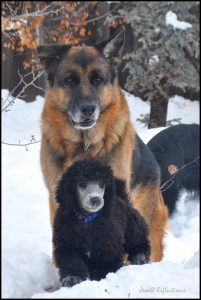BY FRAN JEWELL

In this day of the purely positive training philosophies that insist dogs do not have to endure pressure of any kind, I am astounded that a wider consciousness has not been taken. I want my training to be humane, honest and fair. This article is not entirely about training philosophies, but more about everyday life that our dogs are exposed to and the expectations we dog owners have of our dogs.
I have written before about how I believe canine aggression is more rampant than ever. Hardly a day goes by that I don’t hear someone tell me how their dog has been attacked by another dog or that their own dog is responsible for attacking dogs, and even sometimes attacking people. The trauma involved in dog fights is unfathomable for both the dog and the owner who witnesses it. Yet, I believe we are not looking at the real reason these dog behaviors are escalating.
When I was small, no one ever had multiple-dog households. No one had “play dates” for their dog with other dogs, and there were no such things as dog parks or doggie daycare. If you were not going to have someone home for the dog, you didn’t get one. We didn’t take dogs on planes with us. If you didn’t have a safe, fenced-in yard, you didn’t have a dog. Our family dog went with us on all the family trips and vacations, and we never worried about another dog attacking our dog. She was always on a leash and so were other dogs. She was devoted to our family. She lived a happy life.
In our new mode of having our family dog with us everywhere and now believing that every dog must have dog friends, we are forcing our dogs into stressful situations without bad intentions. Our intentions have been to give dogs a better quality of life without seeing the long-term potential consequences.
Somewhere along the line we have internalized that dogs must have doggie friends. We even believe that our dogs must play hard to “take the edge off,” so they are better behaved at home instead of training them to be responsible and happy family members.
It is my contention that dogs with too much energy for living at home are suffering from anxiety of not knowing the rules and having no fair training. Or, they are dogs intended for work that are being brought into our lives as pets instead of having a real job.
Imagine the pressure that puts on the dog to survive. While some individual dogs do like to play with other dogs, many of them are very uncomfortable with it. As descendents of wolves (yes, they are), dogs are social with their pack—your family. A wolf would never go have a party with the pack next door. When we continually expect and try to force a dog that is uncomfortable with other dogs to get along with every dog, it creates enormous pressure for them and, consequently, many dogs lash out with aggression to protect themselves.
Unintentionally, I think we have put dogs in situations they are not intuitively capable of handling. From my point of view, I think dogs that have good homes are dogs that can stay home with a nourishing backyard full of wonderment, smells, toys, games, and an owner that spends time with them playing together.
As owners, I suggest that we take the time to be with our dogs to teach them and play with them instead of expecting other dogs to do that for them. Relieving that pressure to get along with every dog could make enormous differences in the number of aggressive attacks and, in the long run, make your relationship with your dog even more enriching than ever.
Fran Jewell is an Idaho Press Club award-winning columnist, IAABC-certified dog behavior consultant, NADOI-certified instructor #1096 and the owner of Positive Puppy Dog Training, LLC, in Sun Valley. For more information, visit positivepuppy.com or call (208) 578-1565.
